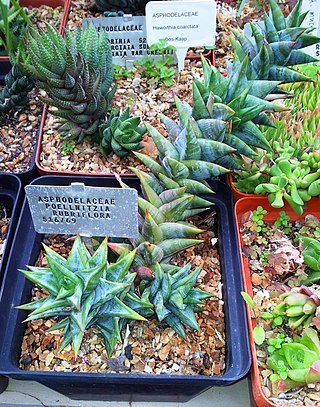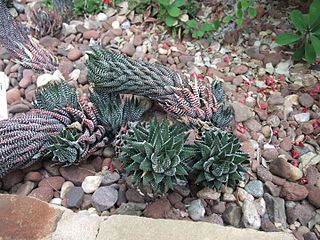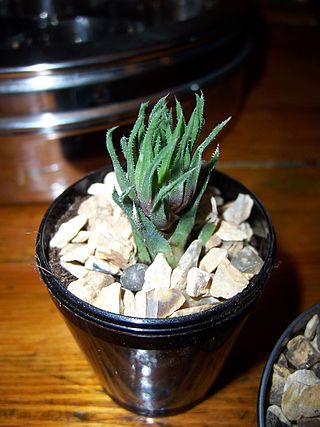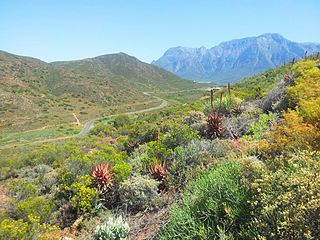
Asphodeloideae is a subfamily of the monocot family Asphodelaceae in the order Asparagales. It has previously been treated as a separate family, Asphodelaceae sensu stricto. The family Asphodelaceae has now been proposed to be a nomen conservandum, and the proposal has been recommended for ratification in 2017. In that case, Asphodelaceae will have priority over Xanthorrhoeaceae. This is reflected in the APG IV family lists.

Asphodelaceae is a family of flowering plants in the order Asparagales. Such a family has been recognized by most taxonomists, but the circumscription has varied widely. In its current circumscription in the APG IV system, it includes about 40 genera and 900 known species. The type genus is Asphodelus.

Haworthia is a large genus of small succulent plants endemic to Southern Africa (Mozambique, Namibia, Lesotho, Eswatini and South Africa).

Gasteria is a genus of succulent plants, native to South Africa.

Astroloba rubriflora is a succulent plant found in the mountainous Karoo area around Robertson, South Africa. It is listed as a Vulnerable species on the IUCN global Red List.

Haworthiopsis coarctata, formerly Haworthia coarctata, is a species of flowering succulent plant from the Eastern Cape Province, South Africa and naturalized in Mexico. It is one of the species of Haworthiopsis that is commonly cultivated as an ornamental.

Haworthiopsis reinwardtii, formerly Haworthia reinwardtii, is a species of succulent flowering plant in the family Asphodelaceae, native to the Eastern Cape Province of South Africa. It is one of the species of Haworthiopsis that is commonly cultivated as an ornamental.

Haworthia mirabilis is a species of the genus Haworthia belonging to the family Asphodelaceae.

Haworthiopsis venosa, formerly Haworthia venosa, known in Afrikaans as venstertjie, is a species of flowering plant in the genus Haworthiopsis belonging to the family Asphodelaceae, native to Namibia and South Africa.

Astroloba is a genus of flowering plants in the family Asphodelaceae, subfamily Asphodeloideae, native to the Cape Province of South Africa.

Haworthia angustifolia is a species of Haworthia from the eastern Cape Province. It is an evergreen succulent plant with short leaves arranged in rosettes of 8 cm in diameter. The leaves, about 20, are upright, acuminate and lanceolate, 3–6 cm long and 6–12 mm wide.

Tulista is a small genus of succulent plants endemic to South Africa. They were formerly included within the genus Haworthia.

Robertson Karoo is a semi-arid vegetation type, restricted to sections of the Breede River Valley, Western Cape Province, South Africa. It is a subtype of Succulent Karoo and is characterised by the dominance of succulent plant species, and by several endemic plants and animals.

Haworthiopsis nigra, formerly Haworthia nigra, is a species of flowering succulent plant from the Western and Eastern Cape Provinces, South Africa.

Haworthiopsis pungens, formerly Haworthia pungens, is a species of flowering succulent plant from the Eastern Cape Province, South Africa.

Haworthiopsis viscosa, formerly Haworthia viscosa, is a species of flowering succulent plant from the Western and Eastern Cape Provinces, South Africa.

Haworthia decipiens ("Papierrosie") is a species of Haworthia, in the family Asphodelaceae, in the Western Cape and Eastern Cape Provinces of South Africa.

Aloeae is a tribe of succulent plants in the subfamily Asphodeloideae of the family Asphodelaceae, consisting of the aloes and their close relatives. The taxon may also be treated as the subfamily Alooideae by those botanists who retain the narrower circumscription of Asphodelaceae adopted prior to the APG III system. Typically, plants have rosettes of more or less succulent leaves, with or without a distinct stem. Their flowers are arranged in racemes and tend to be either small and pale, pollinated by insects, or larger and more brightly coloured, pollinated by birds. As of 2017, 11 genera are recognized, most created since 2010 by splitting off another five genera from Aloe and another two from Haworthia. Only two genera, Aloe and Aloidendron, are native outside southern Africa, extending northwards to the Arabian Peninsula. Seven genera are restricted to South Africa, some with small ranges. Members of the Aloeae are cultivated by succulent plant enthusiasts; Aloe species especially are used in temperate climates as ornamental garden plants. Some species are used in traditional medicine. Aloe vera and Aloe ferox are cultivated for their extracts, whose uses include moisturizers and emollients in cosmetics.

Haworthia reticulata is a species of succulent plant native to the southwestern Cape Provinces of South Africa. The species has several varieties, including var. hurlingii which is the smallest at up to 1 inch (2.5 cm) wide.



















